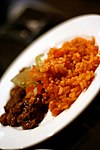Bolillo
This article needs additional citations for verification. (March 2013) |
 | |
| Alternative names | Pan francés (El Salvador) |
|---|---|
| Type | Bread |
| Place of origin | |
| Region or state | Americas |
A bolillo (Spanish pronunciation: [boˈliʝo]) (in Mexico) or pan francés(in Central America) (meaning "French bread") is a type of savory bread made in Mexico and Central America. It is a variation of the baguette, but shorter in length and is often baked in a stone oven. Brought to Mexico City in the 1860s by Emperor Maximilian's troupe of cooks, its use quickly spread throughout the country.[1]
It is roughly 15 centimeters (5.9 in) long, in the shape of an ovoid, with a crunchy crust and a soft inside known as migajón (Spanish pronunciation: [miɣaˈxon]). It is the main ingredient for tortas and molletes. It has a slash on top made with a slashing tool or bread lame, this permits the exhaust of steam and the expansion of bread without stressing its skin. A variation of the bolillo is the 'telera', which is very similar, but in this case, is usually softer and as a current trend sweeter. Other variations include bolillos made of alternate ingredients such as whole wheat, wheat germ, or flax.
Names[]
The bolillo is a variation of the baguette, and thus often has names in the local language reflecting this. In Guadalajara and Sonora, they are called birotes which are often made with sourdough. In northern Mexico, they are known both as bolillos and pan blanco, whereas in northeast Mexico it is known as pan francés. In Sinaloa, they are called torcido and birote. In Central America, especially in El Salvador, it is also known as pan francés and in Guatemala it is known as pirujo. In Panama, a similar but longer type of bread is known as flauta (flute) while pan francés refers to the thinner, crustier French baguette. In Brazil, a similar bread is made and known as pão francês or pão de sal ("bread of salt"). In the Philippines, another similar baguette-derived bread is known as pan de sal (also "bread of salt").
Slang[]
Bolillo is a slang term used in some parts of Mexico and the United States as an insult to refer to Mexicanos or Chicanos who act "White" because Bolillos are brown on the outside, but white on the inside. A more common meaning is used when a person says the expression "puro bolillo" (lit. "only French bread"), which is equivalent with the English slang word zilch.[2]
References[]
- ^ "I am packing my own Torta…". Pati Jinich. June 11, 2009. Archived from the original on 2016-04-19.
- ^ www.significadode.org. "PURO+BOLILLO - Diccionario Abierto de Español". www.significadode.org.
- Cuisine of the Southwestern United States
- Mexican breads
- Mexican slang
- Salvadoran cuisine
- Spanish slang










